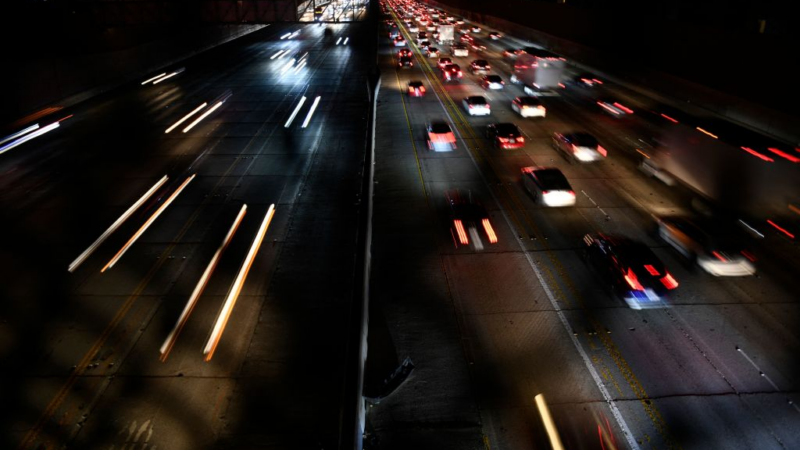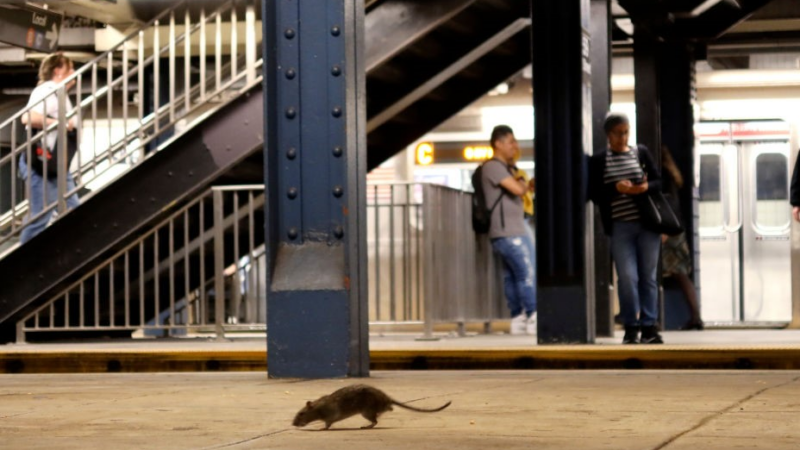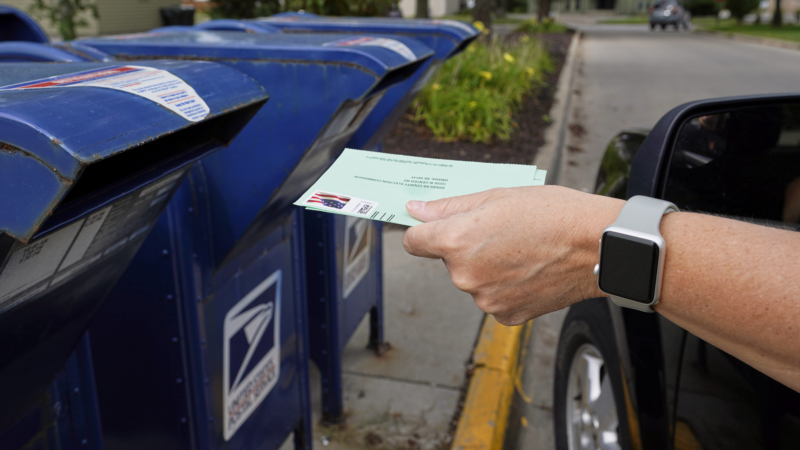Should your car warn you that you’re speeding? California lawmakers vote yes
When California state senator Scott Wiener introduced a bill to limit speeding earlier this year, he expected some pushback.
Still, the intensity of that response caught the Democratic lawmaker from San Francisco by surprise.
“It did touch a nerve,” Weiner said in an interview. “The day that I announced the original version of the bill, one of my very best friends in the world texted me to tell me what a terrible idea it was. And then 10 minutes later, his boyfriend texted me to say, ‘thank you for getting my boyfriend to slow down.’”
Your car probably tells you when you’re running out of gas. It might alert you when you drift out of your lane. Now California lawmakers want to go a step further, requiring technology in your car to warn you when you’re speeding.
Safety advocates say speed assistance technology can reduce traffic deaths, but critics say California is moving too fast.
“What they’re trying to do is to impose their will on the rest of the country,” said Jay Beeber with the National Motorists Association, a driver advocacy group.
To understand why Wiener’s bill has been so divisive, it helps to know how speed assistance technology works. There’s an “active” version, which can physically stop drivers from exceeding the speed limit. But there’s also a “passive” version of speed assistance that only warns the driver when they’re going too fast.
After the initial pushback, Wiener changed his bill from active to passive speed assistance. And while some safety advocates might be disappointed, Wiener defends the decision.
“We listened and we heard,” Wiener said. “Once we looked at the studies, we saw that the passive speed limiter is also highly effective. And so I was comfortable making that change.”

There were political calculations involved, as well.
“The bill would not have passed with the active speed limiter,” Wiener conceded. “And it did pass with the passive speed limiter.”
The bill approved by the California legislature over the weekend would require all new cars sold in the state to warn drivers if they’re going more than 10 miles per hour over the speed limit. California would be the first state in the country to mandate speed assistance technology, starting with the 2030 model year.
The bill has some big backers, including the National Transportation Safety Board.
“Broad deployment of intelligent speed assistance would reduce the frequency of speeding and speeding-related crashes… saving lives and preventing injuries,” the NTSB wrote in support of the California bill, “and we applaud you for pursuing this policy.”
The NTSB can make recommendations, but it cannot force automakers to add speed assistance.
Critics of California’s bill say it’s too much, too soon.
“The technology is not perfect,” Beeber said in an interview. “You’re gonna have a lot of false positives.”
It’s easy for speed assistance technology to get confused, Beeber says, especially between highways and nearby surface streets with vastly different speed limits. He thinks that will annoy and potentially distract drivers.
“Unfortunately our cars right now are kind of in the business of distracting us,” Beeber said. “I think this increases distracted driving.”
The auto industry doesn’t like the speed assistance bill, either.
Speed assistance systems “rely on clear and visible speed limit signs placed at regular intervals to function properly,” wrote the Alliance for Automotive Innovation, an industry trade group, in comments opposing the bill.
“That sort of infrastructure is in place in Europe,” where passive speed assistance is already mandatory. “But it is severely lacking in the U.S. As a result, many/most intelligent speed assist systems are glitchy and unreliable in the U.S.,” the group wrote.
“It’s another example of California’s overreach,” said Karen Bailey-Chapman, with the Specialty Equipment Market Association, an industry trade group, in an interview.
California is a huge market for carmakers, and Bailey-Chapman says the state is trying to bully its way into setting policy for the whole country.
“We believe that the authority for regulations stands firmly within the federal government,” she said.
But the bill’s sponsor, Scott Wiener, says California can’t wait for federal regulators.
“I would love for the federal government to require this technology nationally,” he said. “But there is no indication – no real indication – that the federal government’s going to do that.”
Wiener compares the situation to the early 1960s, when Wisconsin moved to require seat belts more than six years before the federal government did.
“How many lives have been saved because Wisconsin stepped out ahead of the federal government in 1962 and required seatbelts, which started a domino effect nationally?,” he asked.
California’s speed assistance bill now heads to the desk of Governor Gavin Newsom, who has until the end of the month to decide whether he’ll sign it into law.
Transcript:
MARY LOUISE KELLY, HOST:
Your car probably tells you when you’re running out of gas. It might tell you when you drift out of your lane. Now, a bill in California would require your car to warn you when you are speeding. Safety advocates say so-called speed assistance technology can reduce traffic deaths, but critics say California lawmakers are the ones moving too fast. NPR’s Joel Rose reports.
JOEL ROSE: When State Senator Scott Wiener introduced his bill to limit speeding, he expected some pushback.
SCOTT WIENER: It did touch a nerve because when it comes to driving in the U.S., there’s a culture of freedom – I can do what I want to do.
ROSE: Still, the intensity of that response caught Wiener, a Democrat from San Francisco, by surprise.
WIENER: The day that I announced the original version of the bill, one of my very best friends in the world texted me to tell me what a terrible idea it was, and then 10 minutes later, his boyfriend texted me to say, thank you for getting my boyfriend to slow down.
ROSE: To understand why the bill was so divisive, it helps to know how speed assistance technology works. There’s an active version, which can prevent you from driving over the speed limit, but there’s also a passive version of speed assistance that only warns the driver when they’re going too fast. After the pushback, Wiener decided to change his bill from active to passive.
WIENER: So we listened, and we heard. And the bill would not have passed with the active speed limiter, and it did pass with the passive speed limiter.
ROSE: The bill approved by the California Legislature over the weekend would require all new cars sold in the state to warn drivers if they’re going more than 10 miles per hour over the speed limit. California would be the first state in the country to mandate speed assistance technology, starting with the 2030 model year. The bill has big backers, like the National Transportation Safety Board. Here’s NTSB Chair Jennifer Homendy last year.
JENNIFER HOMENDY: Twelve thousand people are dying on our nation’s roads annually due to speeding-related crashes. Nobody has a right to speed. Nobody has a right to break the law.
ROSE: But to critics, this bill is still too much, too soon.
JAY BEEBER: The technology is not perfect. This is problematic. You’re going to have a lot of false positives.
ROSE: Jay Beeber is with the National Motorists Association, a driver advocacy group. He says it’s easy for speed assistance technology to get confused, especially between highways and nearby surface streets with vastly different speed limits. Beeber thinks that will annoy and potentially distract drivers.
BEEBER: Unfortunately, our cars right now are kind of in the business of distracting us. I think this increases distracted driving.
ROSE: The auto industry doesn’t like the speed assistance bill either. Karen Bailey-Chapman is with the Specialty Equipment Market Association, a trade group. California is a huge market for carmakers, and Bailey-Chapman says the state is trying to bully its way into setting policy for the whole country.
KAREN BAILEY-CHAPMAN: It’s another example of California’s overreach. We believe that the authority for regulations stands firmly within the federal government.
ROSE: But the bill’s sponsor, Scott Wiener, says California can’t wait for federal regulators. He compares the situation to the early 1960s, when Wisconsin moved to require seat belts more than six years before the federal government did.
WIENER: How many lives have been saved because Wisconsin stepped out ahead of the federal government in 1962 and required seat belts, which started a domino effect nationally?
ROSE: Wiener’s speed assistance bill now goes to California Governor Gavin Newsom. He has until the end of the month to decide whether he’ll sign it into law. Joel Rose, NPR News.
(SOUNDBITE OF CHARLI XCX SONG, “360”)
A “golden age” of rat research may be here. What the often unwanted companions can teach us about us
Rat and human lives have long intersected, but there's little relatively little research about them. Thanks to advances in genomics and paleoarcheology mean a lot more study may be on the horizon.
2 former migrant farmworkers reflect on their journey together
Emma and Rogelio Torres reminisce about how unlikely a pairing they were when they first met as migrant farmworkers in Arizona. They met in the 80s near Yuma — with love the last thing on their minds.
Voters are advised to return their ballots early because of mail delay concerns
Election officials are raising concerns about the U.S. Postal Service's ability to handle this fall’s expected influx of election mail. But USPS say it’s ready to deliver the country’s ballots.
Deadly high blood pressure during pregnancy is on the rise
More pregnant women are being diagnosed with dangerously high blood pressure, which risks the life of the parent and child. Montana is one of the states improving screening and treatment.
Turkey wants to regulate Germany’s beloved döner kebab street food
Under Turkey's proposal, beef would be required to come from cattle that is at least 16 months old, and be marinated with specific amounts of fat, yogurt or milk, onion, salt, thyme, and pepper.
An iconic Churchill photo stolen in Canada and found in Italy is ready to return
Canadian and Italian dignitaries marked the successful recovery of a portrait of Winston Churchill known as "The Roaring Lion," stolen in Canada and recovered in Italy after a two-year search.





